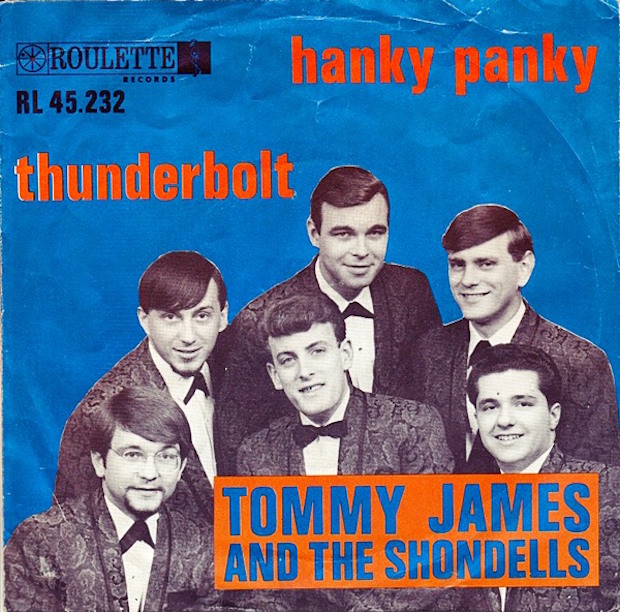July 16, 1966
- STAYED AT #1:2 Weeks
In The Number Ones, I'm reviewing every single #1 single in the history of the Billboard Hot 100, starting with the chart's beginning, in 1958, and working my way up into the present.
God bless garage rock. At the same mid-'60s point where British Invasion stars like the Beatles and the Rolling Stones were figuring out new ways to make their music more complex and innovative, American teenagers were taking those bands' sounds and turning them into something gloriously stupid. All across the country, American kids were starting bands, bashing out catchy hammerhead riffs, and recording singles for local labels. Usually, those songs faded into obscurity. (The Nuggets compilation series -- begun in 1972 and compiled by future Patti Smith Group guitarist Lenny Kaye -- did an amazing job collecting those songs and turning them into a narrative.) Sometimes, though, those songs blew up. Sometimes, that took time.
"Hanky Panky" started its story in the pre-Beatles era. Ellie Greenwich and Jeff Barry, the married songwriting duo responsible for hits like the Dixie Cups' "Chapel Of Love" and the Shangri-Las' "Leader Of The Pack," made their own singles under the name the Raindrops. They wrote "Hanky Panky" in 1963, but they thought it was too stupid to be a single. (They were right! Their version, even at two and a half minutes, was unlistenably repetitive.) Instead, they released it as a B-side to "That Boy John," a single that went nowhere.
In 1959, a 12-year-old Michigan kid named Tommy Jackson formed a local band called the Echoes. They changed their name, first to Tom And The Tornadoes, and then the Shondells. One night in South Bend, Tommy Jackson heard a local band cover "Hanky Panky" in a club. He decided that he wanted his band to cover it. Jackson couldn't remember all the song's words, so he made some up on the spot. It didn't matter. It's not like the song had all that many words to begin with.
In quintessential garage-rock fashion, the Shondells' "Hanky Panky" got some local burn around Michigan when it came out in February of 1964, but it disappeared soon enough. The Shondells broke up when they all graduated from high school in 1965. But later that year, a Pittsburgh DJ started playing his copy of the Shondells' version of "Hanky Panky," and it blew up locally. A local label printed up bootleg copies and sold tens of thousands of them. Finally, a Pittsburgh promoter called Jackson up and asked if he could play a show. The other Shondells had all moved on with their lives, and Jackson couldn't convince them to come with him. So he went into a bar in Latrobe, Pennsylvania and asked the band that was playing, the Raconteurs, to become the new Shondells. Jackson changed his name to Tommy James, and all of a sudden, he had a career.
I don't know whether "hanky panky" was already a term for sex when the Shondells recorded their song, but it might as well have been. "Hanky Panky," as the Shondells played it, is a deeply horny song, James' voice full of both swagger and disbelief. He sounds like the first kid in high school who's getting laid on a regular basis. So he brags to his friends, reveling in how much cooler he is than the rest of them, but at the same time he can't believe his luck.
It's a beautifully amateurish record, too. There's reverb smeared all over the guitars. They snake through with sinister panache, their duelling post-rockabilly riffs slowed down to a purr. There's not really a chorus; it's mostly just James repeating that main phrase over and over. If there's a structure to the song, it's mostly that James is getting more excited to yell that his baby does the hanky panky. And so it works as a sloppy, sinuous groove, one that could potentially keep going for hours.
"Hanky Panky" got to #1 after James signed with Roulette Records, a label that turned out to be run by the New York City gangster Morris Levy. So James lived the next few years of his life in fear of mob violence. But he kept cranking out songs just as commendably dumb as "Hanky Panky," first falling into the burgeoning bubblegum movement and then branching out into lightly psychedelic pop. The Shondells only got to #1 once more, but years later, covers of two of their songs were back-to-back late-'80s #1s for Billy Idol and Tiffany. When you're that good at stupidity, your stupidity can become eternal.
GRADE: 8/10
BONUS BEATS: Here's Joan Jett And The Blackhearts' cover of "Hanky Panky," released on the 1999 compilation Fetish:






